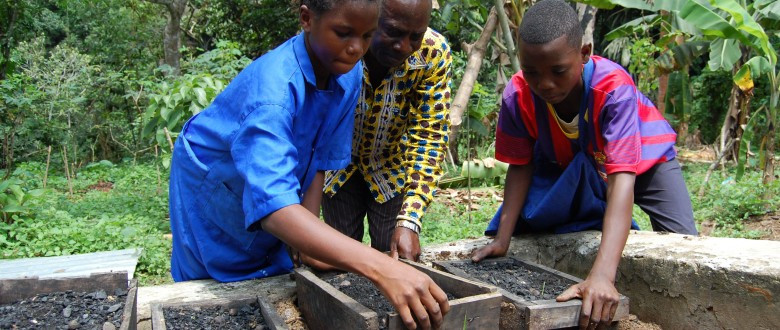
Throughout VVOB’s last years working with education stakeholders in the DR Congo, collaboration with the country’s inspection services were a priority. This approach ensured results and impact surpassed the schools directly involved in the activities. Various external partners noted the benefits of this approach. What made this collaboration successful?
VVOB’s ETAGE programme (2017-2021) supported teachers and school leaders of technical agricultural schools to firmly embed entrepreneurship education in a cross-curricular way, rather than only offering it to students in a stand-alone course. By embedding school-based production units at the very centre of the learning process, learners’ technical skills and business insights are stimulated.
Entrepreneurship skills are thus boosted in learners, and the DRC’s youth are empowered to seize the opportunities offered by their naturally rich environment.
The 5-year ETAGE programme was implemented in 30 pilot schools in the province of Kongo Central. Teachers and school leaders entered into trajectories of professional development to strengthen their “agri-entrepreneurship” teaching skills. Those trajectories were documented and published – to inform the government’s further replication of the ETAGE approach in many more schools throughout the province and country.
A key player throughout ETAGE were the inspection services, whom VVOB involved closely to ensure the further scaling process encountered little obstacles.
Key aspects to the successful partnership in ETAGE
- Intrinsic motivation. Entrepreneurial education is critically relevant for agricultural schools. This seems the most obvious starting point, and external evaluators indeed pointed out all stakeholders’ intrinsic motivation to make the programme a success, looking towards scaling.
- Bottom-up approach. In VVOB’s previous work with the government, the focus was mainly on reformulating the curriculum for agricultural technical education into a more competence-oriented one, with enough attention given to entrepreneurial education. While key figures within the inspection services were trained to ensure the innovations would find their way to classroom practice, ETAGE zoomed in on the teachers and school leaders directly. This more hands-on approach was necessary to first analyse the given situation and potential in schools, and then train teachers and school leaders on basic entrepreneurial skills where necessary. This switch to a bottom-up way of doing things did not mean government officials were less involved. On the contrary: the inspection services and VVOB worked as a tandem in the development of the different model. The external evaluators indicated: “The model presented at the end of the programme is not only the crowning achievement or success of the programme, but also the basis for replication at provincial and national level.”
- Co-creation. To avoid the many pitfalls that accompany a one-off hand-over at the end of a programme, co-creation is part of every VVOB programme from the very beginning, and throughout. Co-creation goes beyond keeping partners informed. To support schools properly in the integration of quality entrepreneurial education, government inspectors needed to have both the knowledge of production management and shift their way of working. 30+ inspectors received a certificate training to this end: “We are no longer as a policeman entering schools to note what goes wrong but we take up the role of coach to help schools in the process.” Following the advice from the inspectors to ensure the ETAGE approach to supporting schools is easily integrated into their day-to-day operations, further anchored it in the work of the inspection service, stimulated ownership and paved the way for replication and scaling.
These three aspects of the partnership between VVOB and the inspection services over the last few years led to active contribution and implication of the inspectors in their schools. Especially during the COVID pandemic the impact was palpable, as VVOB relied heavily on inspectors to organise follow-up moments with the schools. Activities were even organised autonomously – of course with ETAGE’s support – and VVOB was kept abreast the evolutions within schools.




